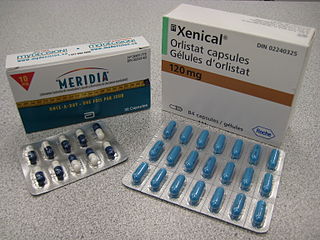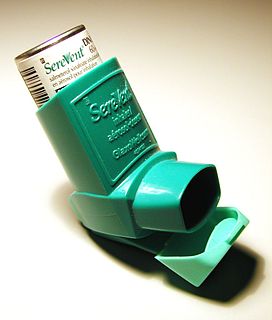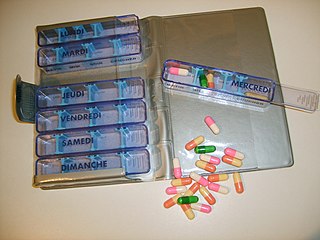
A tablet is a pharmaceutical oral dosage form or solid unit dosage form. Tablets may be defined as the solid unit dosage form of medicament or medicaments with suitable excipients. It comprises a mixture of active substances and excipients, usually in powder form, pressed or compacted from a powder into a solid dose.

Anti-obesity medication or weight loss medications are pharmacological agents that reduce or control weight. These medications alter one of the fundamental processes of the human body, weight regulation, by altering either appetite, or absorption of calories. The main treatment modalities for overweight and individuals with obesity remain dieting and physical exercise.

An inhaler is a medical device used for delivering medicines into the lungs through the work of a person's breathing. This allows medicines to be delivered to and absorbed in the lungs, which provides the ability for targeted medical treatment to this specific region of the body, as well as a reduction in the side effects of oral medications. There are a wide variety of inhalers, and they are commonly used to treat numerous medical conditions with asthma and chronic obstructive pulmonary disease (COPD) being among the most notable.
In medicine, patient compliance describes the degree to which a patient correctly follows medical advice. Most commonly, it refers to medication or drug compliance, but it can also apply to other situations such as medical device use, self care, self-directed exercises, or therapy sessions. Both patient and health-care provider affect compliance, and a positive physician-patient relationship is the most important factor in improving compliance. Access to care plays a role in patient adherence, whereby greater wait times to access care contributing to greater absenteeism. The cost of prescription medication also plays a major role.

Pill-splitting refers to the practice of splitting a tablet or pill to provide a lower dose of the active ingredient, or to obtain multiple smaller doses, either to reduce cost or because the pills available provide a larger dose than required. Many pills that are suitable for splitting come pre-scored so that they may easily be halved.
A Patient Safety Organization (PSO) is a group, institution, or association that improves medical care by reducing medical errors. Common functions of patient safety organizations are data collection and analysis, reporting, education, funding, and advocacy. A PSO differs from a Federally designed Patient Safety Organization (PSO), which provides health care providers in the U.S. privilege and confidentiality protections for efforts to improve patient safety and the quality of patient care delivery

A package insert is a document included in the package of a medication that provides information about that drug and its use. For prescription medications, the insert is technical, providing information for medical professionals about how to prescribe the drug. Package inserts for prescription drugs often include a separate document called a "patient package insert" with information written in plain language intended for the end-user—the person who will take the drug or give the drug to another person, such as a minor. Inserts for over-the-counter medications are also written plainly.
A combination drug or a fixed-dose combination (FDC) is a medicine that includes two or more active ingredients combined in a single dosage form. Terms like "combination drug" or "combination drug product" can be common shorthand for a FDC product, although the latter is more precise if in fact referring to a mass-produced product having a predetermined combination of drugs and respective dosages. And it should also be distinguished from the term "combination product" in medical contexts, which without further specification can refer to products that combine different types of medical products—such as device/drug combinations as opposed to drug/drug combinations. Note that when a combination drug product is a "pill", then it is also a kind of "polypill" or combopill.
Home automation for the elderly and disabled focuses on making it possible for older adults and people with disabilities to remain at home, safe and comfortable. Home automation is becoming a viable option for older adults and people with disabilities who would prefer to stay in the comfort of their homes rather than move to a healthcare facility. This field uses much of the same technology and equipment as home automation for security, entertainment, and energy conservation but tailors it towards old people and people with disabilities.

A dry-powder inhaler (DPI) is a device that delivers medication to the lungs in the form of a dry powder. DPIs are commonly used to treat respiratory diseases such as asthma, bronchitis, emphysema and COPD although DPIs have also been used in the treatment of diabetes mellitus.

Capsule endoscopy is a medical procedure used to record internal images of the gastrointestinal tract for use in disease diagnosis. Newer developments are also able to take biopsies and release medication at specific locations of the entire gastrointestinal tract. Unlike the more widely used endoscope, capsule endoscopy provides the ability to see the middle portion of the small intestine. It can be applied to the detection of various gastrointestinal cancers, digestive diseases, ulcers, unexplained bleedings, and general abdominal pains. After a patient swallows the capsule, it passes along the gastrointestinal tract, taking a number of images per second which are transmitted wirelessly to an array of receivers connected to a portable recording device carried by the patient. General advantages of capsule endoscopy over standard endoscopy include the minimally invasive procedure setup, ability to visualize more of the gastrointestinal tract, and lower cost of the procedure.

First Databank (FDB) is a major provider of drug and medical device databases that help inform healthcare professionals to make decisions. FDB partners with information system developers to deliver useful medication- and medical device-related information to clinicians, business associates, and patients. FDB is part of Hearst and the Hearst Health network.

A pill organiser, pill container, dosette box, pillcase or pillbox is a multicompartment compliance aid for storing scheduled doses of medications. Pill organisers usually have square-shaped compartments for each day of the week, although other more compact and discreet versions have come to market, including cylindrical and pen-shaped cases. Some organisers have sections corresponding to times of the day. Pill organisers are viewed as a way to prevent or reduce medication errors on the part of the patient, though evidence of effectiveness is not strong and they have been linked to medication errors.
Pharmacy automation involves the mechanical processes of handling and distributing medications. Any pharmacy task may be involved, including counting small objects ; measuring and mixing powders and liquids for compounding; tracking and updating customer information in databases ; and inventory management. This article focuses on the changes that have taken place in the local, or community pharmacy since the 1960s.
A medical abortion, also known as medication abortion, occurs when drugs (medication) are used to bring about an abortion. Medical abortions are an alternative to surgical abortions such as vacuum aspiration or dilation and curettage. Medical abortions are more common than surgical abortions in most places, including Europe, India, China, and the United States.
A pill reminder is any device that reminds users to take medications. Traditional pill reminders are pill containers with electric timers attached, which can be preset for certain times of the day to set off an alarm. More sophisticated pill reminders can also detect when they have been opened, and therefore when the user is away during the time they were supposed to take their medication, they will be reminded of it when they return. This reminder can be in the form of a light, which also helps for deaf or hearing-impaired users.
Within the field of digital health, digital medicine is a category of pharmaceuticals which combines a prescription medication with an ingestible sensor component. Digital medicines are designed to communicate to mobile and/or web-based applications that a patient has taken a specific dose of medication at a certain time. Because of the ingestible sensor component and association with prescription pharmaceuticals, products in this category require regulatory oversight and clinical validation. Digital medicine(s) aim to improve pharmaceutical therapy by improving patient adherence.
A digital pill is a pharmaceutical dosage form that contains an ingestible sensor inside of a pill. The sensor begins transmitting medical data after it is consumed. The technology that makes up the pill, as well as the data transmitted by the pill's sensor, are considered to be part of digital medicine. The purpose of the sensor is to determine whether the person is taking their medication or not. There are privacy concerns with respect to who receives the data and what is done with it.

The Four Thieves Vinegar Collective is an anarchist biohacking group founded in 2015 by Michael Laufer. They have published instructions for the "EpiPencil", an epinephrine autoinjector, and the "Apothecary MicroLab", a do-it-yourself (DIY) device intended to make a variety of medications, most notably pyrimethamine (Daraprim). They have been criticized by the medical community for causing potential harm to patients with the DIY instructions, but Laufer claims to defend people's right to attempt their own medical treatment.

Nirmatrelvir/ritonavir, sold under the brand name Paxlovid, is a co-packaged oral medication used as a treatment for COVID-19. It contains the antiviral medications nirmatrelvir and ritonavir.










